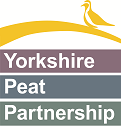YPP works to survey and restore degraded blanket bog in the Yorkshire Dales and the detailed imagery of erosion features provided by an unmanned aerial vehicle (UAV) is invaluable in planning the restoration work. The team are used to flying the UAV over some of the highest peaks in England, however the lowlands presented a whole new set of challenges.
The Great Fen is a long term project that aims to create a living landscape of 37,000 ha of wetland by acquiring farmland and connecting up the last fragments of wild fen; Woodwalton fen and Holme fen. Recently, they have been able to abstract water to begin re-wetting the site and YPP were tasked with providing the aerial imagery to show the extent of the restoration.
To collect the data, the team used a small fixed wing drone known as a Sensefly eBee. It weighs less than 1kg and is programmed to follow specific predetermined flight paths by the operator. As it travels along at 120m above the ground, it captures images detailed enough to distinguish different vegetation types and individual birds on the ground.
Due to the blizzarding snow and extreme conditions with the “Beast from the East”, the UAV was grounded for most of the winter. The unexpected spell of fair weather put the pilots back in action however, in a cruel turn of events, the team were now surveying on what turned out to be the hottest day in April since 1949!
Mark Brown YPP Geospatial Officer and UAV pilot said, “The Great Fen presented a whole new set of challenges compared to our usual surveys out on the hills in the Yorkshire Dales National Park. However the flat nature of the land in the area meant we were able to carry out the surveys much more rapidly. It was almost like going on safari with the sheer amount of bird life and Chinese water deer running around the site.”
Several buzzards and red kites took a momentary interest in the strange flying object and followed its flight for a while before breaking away to catch the thermals. Overall, it was a very successful week. With a total of 29 flights, the team beat our previous record of the largest area surveyed in a week by imaging over 1253 ha, equivalent to about 1764 football pitches!
The hard work of the whole team was recognised when, in June, YPP were handed the CIEEM Best Practice Award for Innovation and were highly commended in the NGO Impact Award.
